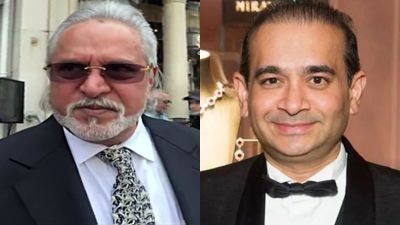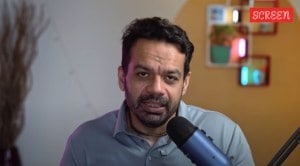‘For reforms to be palatable in the long run, people who benefit from it have to give most of it back’
• When the markets have fallen by nearly 10 per cent, Infosys shares have gone up by about that much. So, is Infosys or information tec...

• When the markets have fallen by nearly 10 per cent, Infosys shares have gone up by about that much. So, is Infosys or information technology politics-proof?
Well, there are a couple of things. One is that a few months back the outsourcing debate was very loud. Now it has abated a bit, so I think that has reduced the pressure. Another is the currency, now the rupee is actually depreciating. And generally our sector is seen as one that the government supports.
• Politics-proof?
Yes, right from 1991, when originally Dr Manmohan Singh and his team did this whole thing for the industry, it has grown from $50 million to $15 billion. So, I think…
• But you know, if I just count the factors that have made the success of Infosys possible. One is chief mentor N R Narayana Murthy and you with your talented team. Second is that India reformed its economy at the same time. Third, that we globalised and so IT became this big sort of product to be sold around the world. Fourth, maybe the fact that India changed temperamentally, we got out of the mindset that somehow industry was just manufacturing. And maybe the fifth, that the government had nothing to do with IT. Do you agree with that list or would you like to chop or add?
No, I’ll chop something. One, I think the government had a lot to do with IT because if we go back to 1991, it was people like N Vittal, who was the DoE (Department of Electronics) Secretary at that time and who later became the CVC, who helped this industry by helping us develop software technology parks, earth stations, tax benefits. I think this is a great case where the government’s proactive involvement has actually benefited the industry.
• Right, right. But not regulation.
Yes, it’s played a promotional role, which is I think the point…
• And which is how it should be, in an economy that is pretty large.
And the other thing is the advancement in telecommunication which made it possible.
• But that is because of the reforms. You have had your brushes with politics in a different way. This is the hostel (in IIT Powai) that you built, or the heads built with their money. And this was then described or dismissed as ‘‘luxurious’’, ‘‘wasteful’’ by the last HRD minister.
Well, you know what happened was this IIT had about 3,000 rooms. And this has been the status, except for the ladies’ hostel, for the last 30 years. Students were living two in a room, in rooms not meant for one person also. So both the IIT authorities and I felt that we could take this greatly forward by building a high-quality hostel. This is a great example of public-private partnership.
• But for it to be dismissed as a luxurious, wasteful and decadent thing! And that too by a government that swore by India Shining.
It is a perfectly good hostel. It has been built for the next 40 years…It is advanced in the sense that it has telephone and LAN connectivity in every room and all the things which we didn’t have in our days.
• Where does this psychology come from that anything which is not comfortable, not dirty or not clumsy is luxurious?
Well, I don’t know where it comes from. All I know is that 200,000 kids appear for IIT entrance exams every year. Some of them go and spend two-three years in places like Kota and study 18 hours a day to get in. And if we can’t give them a decent hostel, what can we do for them?
• After the controversy, you were forbidden from giving money to IITs. You had to go through that silly Bharat Shiksha Kosh.
Well, I think, we really need to go beyond all that. All of us who have contributed to IIT have a great sense of repayment of old debts. And that’s the only motivation that we have. If we can help this place become world-class, that’s all we want. So, if the spirit is understood, I don’t think all these controversies will erupt in the future.
• So how much have you contributed so far to this IIT?
About Rs 22 crore, of which Rs 11 crore is for this hostel.
• How much have the other alumni contributed in this IIT?
Maybe Rs 40-60 crore.
• I believe you also have a new plan, where you are now funding or incubating new starters on the condition that they give away a part of their profits to the IITs.
Yes, one of the things that I did here was set up a business incubator. And it has spawned about eight or 10 companies. The deal is that if they do well, go public and make money, then they will give few percentage points from that equity to IITs.
• It is said very often, in fact many critics of economic reform are now saying, and quite rightly in some ways, that we confuse economic reform with corporate profit. That our corporates lacked conscience, they never wanted to share it with those who got left behind. Or somehow, they broke away from the mainstream of our society. Do you see a problem there, do you see a gap?
No, I think economic reforms to be palatable in the long run. I think people who benefit from that, in terms of wealth creation, have an enormous obligation to give a lot or even most of it back. Because at the end of the day that’s how the US was built, by philanthropy, whether Rockefeller or Gates or Hewlett Packard. So, I think we have to have both sides of the coin if we want to make this whole thing work.
• So paying 33 per cent tax is not enough?
No, it’s not enough. In fact, we should do much more than that.
• And would you agree that corporates or maybe others who have benefited from the corporate boom haven’t shown that conscience?
No, I don’t think so. If you go back to the formation of the Indian Institute of Science, it was a giant private-public partnership between Jamshedji and the Maharaja.
• But by and large, the rich in India do not see the need to give back.
No, I think a lot of it has to do with entrepreneurship because entrepreneurs are first-generation wealth. They can give it all away, nobody can ask them questions. The moment you have inherited wealth, which you haven’t really created, there is much more reluctance in giving it away. Which is why I am saying that liberalisation and entrepreneurship is linked to the kind of philanthropy you are seeing now.
• So, are you saying that a first-generation entrepreneur actually has a healthier social conscience?
No, it’s not that. Well, it is just that if it is inherited then you have an obligation not to fritter it away or whatever. Whereas, if you have made it yourself — like Murthy, myself, we all began with just Rs 200 — at the end of the day, if we leave with Rs 200, it is not a big deal for us.
• You can always make more.
Probably. I hope.
• You’ve talked about Infosys as being a brand with a conscience.
That’s right.
• Are you looking at Microsoft, which is one of the most ruthless, toughest corporations in the world, and still packages itself as a corporation with conscience?
Well, if you look at the founders of Infosys — Narayana Murthy, myself and five other colleagues — we were all from middle-class, humble backgrounds. And all of us with some kind of links in our early days… with a Leftist kind of a background… At IIT, we were all Leftists. Murthy was a Leftist. So, we are really Leftists-turned-capitalists.
• So did you wave the red flag and shout zindabad and murdabad?
No, we did not go that far. But we sat and discussed all radical theories. So all of us have that compassionate…capitalism kind of feeling about us. We are lucky because of all the things that happened that we were able to create this wealth, and so we think part of that is to help in social development.
• Do we see Infosys going more the Microsoft route, giving money for HIV prevention etc?
See, I think there are two things. On the corporate side, the corporation has to have a focus. In our case, our focus is through the Infosys Foundation where we give a part of our profits every year. Sudha Murthy heads the foundation. They do a lot of work. And the second part is what each of us, in our individual capacity, do with our money.
• But you were blocked a little bit under the last government when Dr Murli Manohar Joshi set up the Bharat Shiksha Kosh. Was that disappointing, heart-breaking?
My feeling was that if we can build a hostel with a thousand rooms in 15 months — the capacity of IIT goes up by 30 per cent in 15 months after 30 years — that is not an action you should criticise.
• Did you try to reason with Joshi?
No.
• Did Narayana Murthy try to reason with him?
I don’t know. But you know, I think we really need to do everything to remove the brakes for people pitching in.
• Right, because you find that the establishment somehow gets resentful, if not jealous, of anything that is breaking away and becoming self-sustaining, which is the problem with the IIMs. So, do you see that lessening in India, or do you see that moving in fits and starts?
Well, see this whole paradigm is new. The notion that private equity/ philanthropy can partner with public funds to create institutions of national development is a new concept. It happened with the Indian Institute of Science 100 years back. But it did not happen after that.
• But 100 years back, it was personal. When venerable Mr Tata spoke with venerable Mr Somebody — Nehru or Maharaja — at the other end and things moved. But now it is more institutional.
Yes, but I think this is the only way you can make it happen. Because I think now the challenge is really how to get the best intellectual capital together, and you have to do these private-public partnerships.
• I think the other part of the challenge is how to make wealth creation a good thing in the popular mind. If you look at a discourse after the elections, it seems that what creates wealth is actually anti-poor.
Yes, we will do that I think, because there is no substitute for economic growth and globalisation to remove people out of poverty. The point is how do you make sure that the wealth creation is funnelled into social causes — which requires both taxation, obviously because you have to have a mandatory form, and people who benefit from that wealth creation need to actively play a role in taking it forward to the next level.
• Bangalore actually has become a very interesting metaphor in India as well as overseas. In India, sometimes you see Bangalore as this one island of excellence and wealth which has left the rest behind. And internationally, Bangalore is seen as a place that is stealing their jobs.
That’s right. In fact, John Kerry recently said that he wants to make the US like Bangalore. I don’t know what he meant by that, maybe wired like Bangalore.
• It will take some doing to make US like Bangalore.
And Bangalore is actually a verb. ‘‘To be Bangalored’’ is to lose your job because of off-shoring and out-sourcing. And if you do a Google search you will get 691 hits on Bangalore… In fact, there’s a T-shirt saying: ‘‘My job is being Bangalored’’. This is the last city which became a verb after Shanghai.
• So, where do we go from here? Does Bangalore remain that island of excellence? Should we be embarrassed, squeamish about it?
Well, I don’t think so. As Murthy also said the other day, we need visible signs of progress. We need to reassure ourselves and the world that we can progress. So, you clearly need the symbols. But we can’t stop at these symbols. We have to leverage them for other things.
• John Kerry might say we have to make America like Bangalore, but John Kerry doesn’t know the district of Dodballapur.
Exactly.
• We know, that there is only one Bangalore and it is not good for us just to have it all around one city.
Sure, but you need that economic growth and vitality to create the revenue and taxes for governments to pump into the programmes they need. So, it is not rural vs urban. I think you need both, our whole point is that we do this but don’t neglect the other one.
• In fact, your employees are very young, your average age is 26 years?
That’s right.
• And over 25,000 people, from very diverse sections of society.
Yes, absolutely.
• And not all from IITs only.
Not at all. We go to colleges all over the country, we really have a heterogeneous, multi-lingual, national group. And they are all young people who have studied hard.
• And not necessarily from English-medium backgrounds.
No, not necessarily.
• …and what I call the HMTs or Hindi Medium Types.
From all backgrounds.
• What is your view on reservation?
Well, I think, clearly we need to have affirmative action. We really need to give people an opportunity. But I think the focus has to be on education and making sure that we create high-quality education opportunities for everyone and then provide, obviously, the jobs that can absorb them. Reservation in a company, per se, may not be a great idea.
• Your idea of affirmative action?
I think it is providing support on the educational side. For example, I think the educational cess is a great idea, because we can use that to tax companies to be able to give a lot to primary education.
• So you are not particularly scared of this new debate?
Oh no, I think it is an open debate because you can’t have a system in which only three or four million people in the IT industry have salaries which are denominated in dollars and the rest of the system is not chugging along with it. So you have to do something about it.
• Like this recreational hall that you have built, much better than what was part of the institution of India.
Yes, as I said, these are the best and the brightest. At least, there should be some decent environment for their studying.
• Hopefully, then they will pay back.
Yes, I hope so. That’s the whole idea. We have to create more Narayana Murthys and…
• Nandan Nilekanis…
…and Satyendra Dubeys.
• It is interesting that you mentioned Satyendra Dubey’s name because he is also a famous IIT graduate now. But he became famous for actually choosing the path of idealism. But to me the interesting thing is how the whole community of IITians took up the cause around the world, much more than the media or our paper. Do you see the rise of this new constituency in India?
Yes, I think there is a whole professional class, IITians and IIMians, who have worked the old-fashioned way. And they are really looking for a more just and civil society which recognises people and merit. There is a change in mindset and it is becoming an important constituency.
• And they have built up a critical mass in terms of numbers, clout.
Oh yes, I think they have become one more very key player in the equation of constituencies that are shaping the policies and mindset of this country.
• If I can switch the subject a bit, why have we seen the national mood falling a bit, particularly after the elections?
I think the legitimate focus has gone on challenges of agriculture, job creation and the poor, and I think it’s valid. But we should not forget today that India and China, in many conversations, are spoken of in the same breath. You know people think of China for manufacturing and India for outsourcing. We have created a global image of a brand as a country with a tremendous human capital and intellectual capital. And I think we should use it.
• But still there is a lot of work.
Absolutely.
• But there is one thing that people like you have to battle — the great Indian hypocrisy. I know you don’t want to say it, but I can say it. You know the gentleman who dismissed this hostel as a piece of wastefulness, sat in a nearby five-star hotel, at his party’s national executive meeting. I wonder what he thought of when he looked at this hostel.
Well, I think we have our job to do. We will create wealth, create value and contribute to social progress. We are very focused.
Photos





- 01
- 02
- 03
- 04
- 05

























